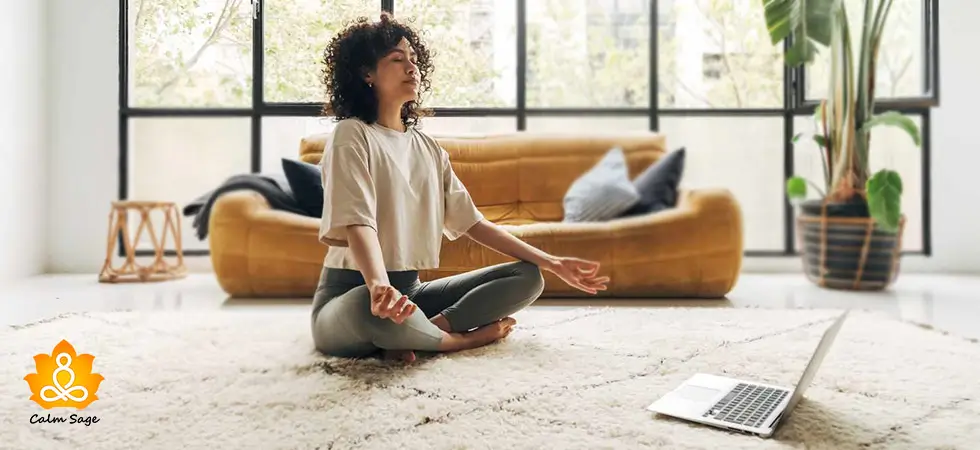The Hidden Benefits Of Guided Sleep Meditation (With Tips)

“That deep silence has a melody of its own, a sweetness unknown amid the harsh discords of the world’s sounds.” – Unknown
There are times when our stress just won’t catch up and let us have a good night’s rest. And then there are days when catching up on sleep is just out of reach, and you find yourself tossing and turning all night.
Having a disruptive sleep and nighttime routine can mess up our habits and make us crankier than usual.
There are many reasons why we struggle with disruptive sleep too – from staying up late to finish a project to mindlessly scrolling through our social media. A healthy sleep routine can help you prevent your unhealthy habits and catch up on the rest your body needs.
A healthy sleep routine can include evening yoga, journaling before bed, deep breathing exercises, and guided sleep meditation.
We’ve talked a lot about the benefits of letting your thoughts still before bed, and doing deep breathing to fall asleep quicker, but in this blog, we’ll be exploring the many hidden benefits of guided sleep meditation or deep sleep meditation.
What Is Guided Sleep Meditation?
Guided sleep meditation or deep sleep meditation involves setting an intention before bedtime and preparing yourself mentally for a successful night’s rest. Like other types of meditation, guided sleep meditation can help you quiet your mind, shut down your thoughts, and allow you to relax enough to rest.
Guided sleep meditation is about letting go of your intrusive and continuous thoughts and relaxing – mind and body – before bed. Similar to other meditations, it’s about bringing your awareness from your thoughts to the present, and by extension, to the sensations your body experiences.
Guided sleep meditation aims at reducing mindless worrying and excessive tension in your body by learning how to center your mind, sharpen your focus, and relax.
A form of guided sleep meditation is “Yoga Nidra” or yogic sleep that is often practiced lying down under the instructions of a guide. With this practice, you sink into your awareness where you are awake but your body rests.
Benefits Of Sleep Meditation
In a study, it was found that almost 30% of people have acute insomnia, and 10% of people have chronic sleep problems. And as we enter adulthood, the hours of sleep we need to get are less than 7 hours each night. This is not healthy nor recommended.
Adults, to fully function, need at least 8 hours of sleep each night and teens need at least 9-10 hours of sleep. In a 2015 study, it was shown that mindfulness meditation proved effective for better sleep quality than just keeping a sleep hygiene routine in more than 45 adults. It’s also observed that the effects of our lack of sleep can carry into our daytime routine and can cause fatigue and depression.
If you’re not used to meditation and need to improve your sleep, then guided sleep meditation can help you improve your sleep.
Here are some of the benefits of guided sleep meditation:
1. It can help you connect with the present and become aware of your bodily sensations. Anxiety and stress can keep you up and prevent you from getting restful sleep. When you learn how to relax before bed, you can learn to let go of the day’s worries and get the sleep you need.
2. It can help counter negative emotions and thinking. Guided sleep meditation can help you let go of the negative thoughts and emotions that keep your mind awake and stressed during the day. Deep sleep meditation can help you activate the parasympathetic nervous system or the rest and digest response (the opposite of the stress response).
3. It can also help you rest in the present moment. When you lie to go to sleep, it’s normal to focus on the thoughts you couldn’t during the day, and without any distractions, it’s easier to focus on the anxiety. This meditation can help you focus on the present and rest your thoughts. Guided sleep meditation allows you to lower your anxiety response aka slow down your breathing.
4. Guided sleep meditation isn’t about forcing yourself to sleep, but it’s about slowing your mind and relaxing your body to prepare for a good night and restful sleep. The benefits of guided sleep meditation can also be seen during the day in the way your thoughts are clear, your mind refreshed, and your thought process sharpens.
Guided sleep meditation involves following the instructions of the narrator or guide over your headphones. The aim is to focus on the instructions and guide instead of what you’re doing or how you’re doing it.
With time and practice, it’ll eventually become easier to meditate without a guide or prompt. So if you can’t find yourself relaxing in the beginning, don’t worry. Keep practicing.
What To Expect?
You can use imagery, body scanning, soothing sounds, relaxing music, and other background sounds to relax. Usually, a guided sleep meditation is delivered using audio (binaural beats). These binaural beats help your mind ease into the deepest rest and make it easier to fall asleep.
In 2020 research, it was found that delta wave music helps the body to get restorative sleep. Another research suggests that delta waves and binaural beats when combined with light therapy can help increase brain neuroplasticity.
In a typical guided sleep meditation, you can find;
1. Voice-over sleep stories are soothing and slow. Through meditation, the guide would help you relax – mind and body. Toward the end of the session, the voice-over will slow down as you’ll find yourself drifting off to sleep.
2. A typical guided sleep meditation can last for 20 minutes to an hour. This can also vary according to the rate you fall asleep normally.
You can find many guided sleep meditations online on YouTube or paid and free sleep meditation apps like Calm and Headspace.
Also Read: 21 Best Guided Sleep Meditation for Anxiety and Stress
How To Practice Guided Sleep Meditation?
A guided sleep meditation session will help you redirect your attention from your thoughts and involves directing your attention to the sensations in your body, without changing them.
During the session, you’ll move through the parts of your body, observing the sensations such as heaviness, tingling, tightness, tension, etc. As you move through the meditation, you’ll relax and release tension in your body, gradually.
You’ll also be guided to let your thoughts move past without lingering on them. As you do this, your body will gradually relax and your breathing will become deeper.
Other than that, a guided sleep meditation session will involve;
1. Breathing exercises: You’ll be asked to count the inhales and exhales. This step will allow your body to slow down and signal your mind that it’s bedtime.
2. Visualization: You’ll be asked to imagine or visualize a picturesque scene or a place in your mind that will help you enter a meditative state. Something akin to the process of hypnosis.
Tips To Help Sleep Better
Additional tips to help you sleep better:
- Limit the use of your electronic devices before bed. It is advisable to avoid using devices such as smartphones, laptops, and TV at least an hour before bed.
- Keep a regular bedtime routine and try to wake up and fall asleep at the same time.
- You can also adjust your room temperature and environment to create a relaxing sleep environment.
- Also, try to minimize any distractions in your room other than white noise or any other background noise you use for sleep.
- Try to keep yourself hydrated by drinking at least 6-8 glasses of water during the day.
- Get regular physical exercise in the evening, but not closer to your bedtime.
- Wear comfortable and breathable clothes to bed.
- And, try to write in a gratitude journal before you sleep.
Bottom Line
Better sleep can help you lower your stress and improve your immune system. However, getting restful sleep can be hard if you don’t keep your stress levels checked. Other medical issues can also interfere with your sleep. If you’re facing trouble falling asleep, then a guided sleep meditation session can help.
The benefits of guided sleep meditation are not just limited to quieting the mind and relaxing your body, but also include learning to be in the present and being aware of your bodily sensations.
Other than practicing guided sleep meditation, you can try to improve your sleep hygiene and if your sleep troubles persist, then you can connect with a sleep specialist to get the right treatment.
I hope this blog helped you understand what guided sleep meditation is and the many benefits of guided sleep meditation.
For more, you can write to us at info@calmsage.com or DM us on social media. You can also comment on your thoughts in the section below.
Take Care and Sleep Well!




















